New thought leadership report from KPMG and GS1 identifies path for future success.
GS1 Australia and KPMG Australia have published a thought leadership report ‘Unlocking the Value of Tomorrow’s Retail’, highlighting the importance of master data in the future of retail supply chains.
The new 16-page report outlines how quality, aligned master data enables the capabilities for businesses to thrive in retail’s age of information.
Master data is defined as the attributes of an organisation’s products, customers and suppliers, and is a core part of business operations, providing essential information, and serving as an enabler of efficiency across many aspects of business, often in the shadows of business operation.
“In tomorrow’s retail, where personalisation, speed to market and omni channel supply chains are increasingly necessary to compete, manufacturers and retailers will find increasing value in having the data integrity to enable these capabilities.
“Today there are more advanced systems in place, but there is still an underlying issue around data integrity. If your data is not good quality or incorrect, it doesn’t matter how efficient the mechanism is that you have to receive it, incorrect data is going to cause issues for everyone in downstream processes,” said GS1 Australia Director of Retail Andrew Steele.
“The role of GS1 as we see it, is to provide open global data standards that can be used by all industry stakeholders. One person might call it a barcode number and somebody else a product number. You need to bring standardisation to the mainly conventional data fields to make it easier for people to look at. It needs to be consistent.”
Quality control of products is becoming more important as the number of data fields a supplier provides to retailers has grown significantly, according to Mr Steele. “There is no better driver of this data being important than the current Covid-19 situation. People spent a lot of time online, which offers up a good example of why quality master data is important because consumers are not physically in the store and they cannot hold the product in their hand and cannot read the product description, nutritional data, allergen declarations, and other relevant product information.”
Co-author of the report and seasoned supply chain practitioner, Ashley Alfs, says she finds “most businesses look for quick fixes to their problems through technology upgrades or re-orgs, but neglect the importance and value of ongoing and robust master data management (MDM). So many of the problems organisations face could be fixed or minimised by focusing on better MDM practices.”
The shifting landscape of the retail industry has amplified the role master data plays and the value it can unlock. Businesses that neglect their master data will realise only after it’s too late, that quality data is no longer a competitive advantage, but an expectation.
Download the report.


